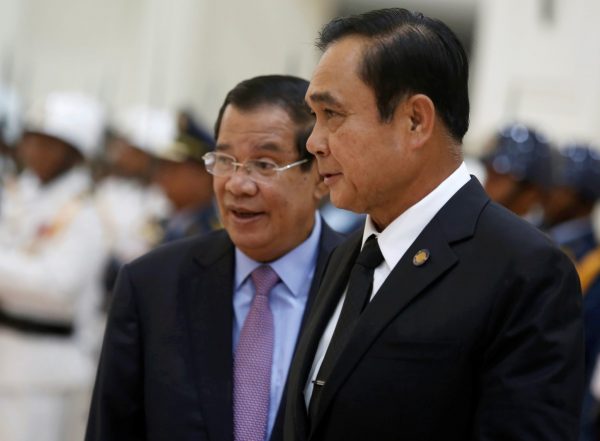But though the deal was hailed by its protagonists as beginning a new era of cooperation, the agreement to hunt down political refugees — if implemented at all — will not dramatically change relations between the two countries.
In the week of 19 March, Cambodia’s Deputy Prime Minister and Minister of National Defence, Tea Banh, travelled to Bangkok to co-chair the 13th meeting of the Cambodian–Thai General Border Committee. Besides meeting his Thai counterpart Prawit Wongsuwon, Banh visited Thai Prime Minister Prayuth Chan-o-cha on the latter’s birthday on 21 March. Banh’s meeting with Prayuth attracted considerably more attention than that of the General Border Committee, a two-decade-old dialogue mechanism that has yet to impress with substantial results.
Banh and Prayuth announced a deal to exchange fugitives and ‘monitor individuals who escape the law by crossing the border’. ‘Fugitives’ likely refer to exiled members of the political opposition from the respective countries. After the coup in Thailand in 2014, over 100 Thai nationals sought refuge in Cambodia, many to avoid lengthy prison sentences under the country’s harsh lese-majeste law. Thailand, in turn, has hosted at least dozens of Cambodia’s ex-opposition party members since the Cambodian National Rescue Party (CNRP) was dissolved in November 2017.
The new deal places the exiled opposition from both countries in an even more precarious situation. Only a few days after the agreement was made public, the Phnom Penh Post reported that vehicles from the Royal Cambodian Armed Forces (RCAF) had been stationed near the Bangkok homes of ex-CNRP members. Phnom Penh justified the presence of the vehicles by saying that the RCAF only operate in Bangkok in cooperation with Thai authorities to tackle transnational crime.
But recent trends indicate that crime suppression can serve as a cover for politically motivated charges. Both the regimes in Cambodia and Thailand are increasingly repressive and share an interest in preventing the political opposition from organising abroad. For Prime Minister Hun Sen and his ruling Cambodian People’s Party (CPP), this is especially relevant ahead of the country’s general elections in July this year.
A case that set a potential precedent earlier in 2018 involved the extradition of a Cambodian labour activist from Thailand in what was a violation of customary international law. The same international law principles also apply under an extradition agreement signed between the two countries in 2011. Accordingly, forced return is permissible only if the crime for which extradition is sought exists in both countries. Extradition needs to be rejected if there is reason to believe that the request is politically motivated.
In 2009, it was on these grounds that Cambodia rejected a request by the then Democratic Party government to extradite former Thai prime minister Thaksin Shinawatra. The rejection came just a week after Hun Sen appointed Thaksin as his economic advisor. Under Thaksin, Thailand and Cambodia had forged closer business ties, and Thaksin and Hun Sen developed a close relationship. But after Thaksin’s ouster in the 2006 coup, bilateral relations deteriorated as a result of conflict at the border near the Preah Vihear temple.
With the regime change in Bangkok in 2014, it is even clearer that reciprocity and political favours weigh more than legal commitments. In the wake of the CPP’s uncomfortably narrow victory in the 2013 elections, Phnom Penh sought international allies and reached out to the newly installed military government in Bangkok. Banh assured Prayuth as early as 2014 that ‘Cambodia has no policy to allow anyone to use its land to operate against Thailand’.
In this sense, the agreement in March to exchange fugitives is a formalisation of developments already underway. All the same, the deal is unlikely to bring about substantial changes. Political alliances based on a common enemy are usually of limited duration. In contrast to positive cooperation for a common good, negative cooperation against a threat tends to aim to do the bare minimum. Such joint security measures have limited objectives and are rarely adopted as part of a larger reform package that would induce a qualitative shift in bilateral relations.
The agreement to exchange fugitives fails to address the range of issues that have led to uneasy relations between Cambodia and Thailand. These include unresolved border disputes, such as the pending implementation of the International Court of Justice’s 2013 ruling on the border near Preah Vihear. Disagreements also cover the growing role of China in Southeast Asia — particularly in Cambodia — as well as several transnational issues such as labour migration, smuggling and illegal logging.
In contrast, the General Border Committee meeting appeared to make some headway in improving cross-border mobility through the creation of several new permanent border gates. If implemented, these measures may facilitate trade and better regulation of illegal crossings. Unlike the authoritarian extradition deal, they could lead to a real improvement in bilateral relations.
Nicole Jenne is Assistant Professor at the Institute of Political Science, Pontifical Catholic University of Chile. Follow her on Twitter at @nicjenne.

